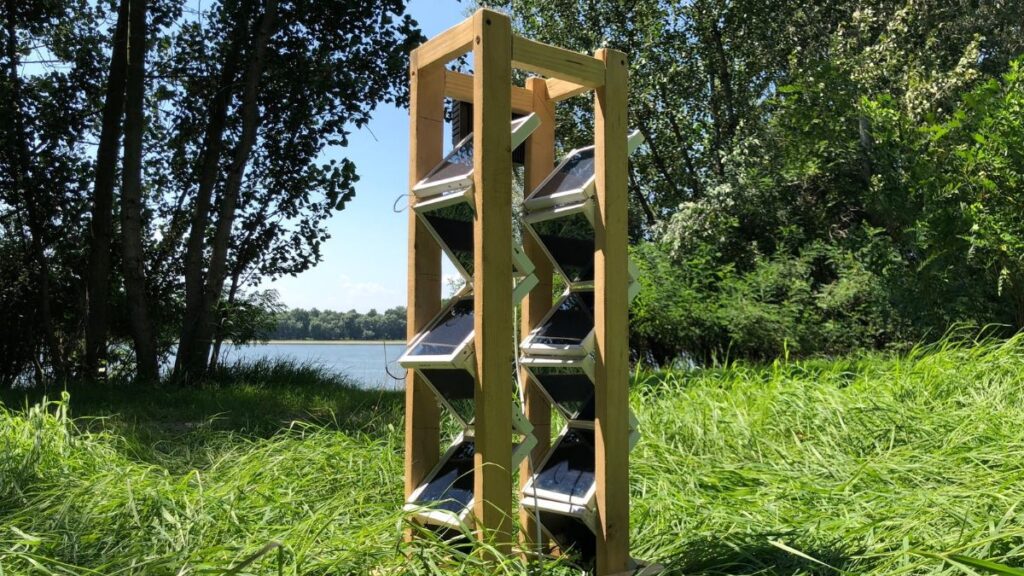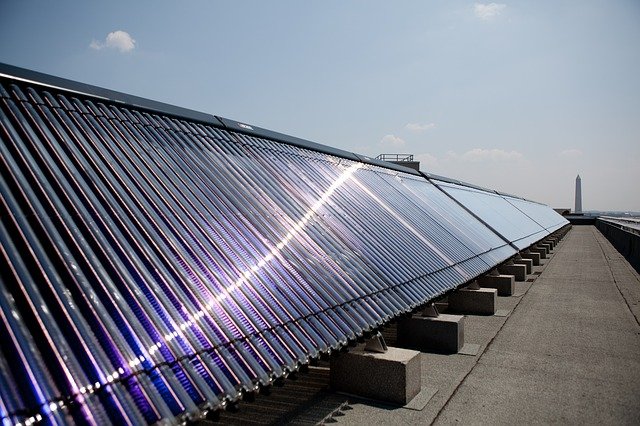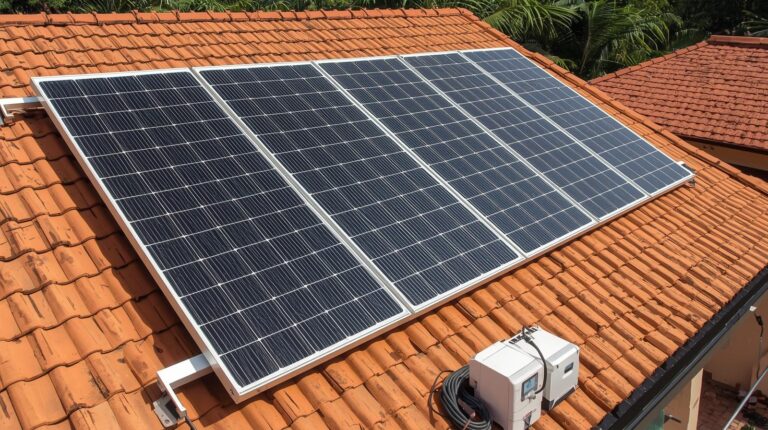Imagine harnessing the power of the sun to heat your water, providing your home with an endless supply of hot water while reducing your carbon footprint. In this comprehensive guide, we will delve into the world of solar hot water heating systems, exploring the basics, different types of systems, components breakdown, installation process, and more.
Whether you are a homeowner or a professional in the field, this guide will equip you with the knowledge needed to make informed decisions about choosing, installing, and maintaining a solar hot water heating system.
A New Dimension for Solar Energy Can Slash Your Power Bills by 65%

>>> WATCH TO SEE HOW IT WORKS <<<
Key Takeaways
- Proper drainage measures are essential for the installation and maintenance of solar hot water heating systems.
- Protection of Integral Collector Storage (ICS) systems is crucial to ensure their proper functioning.
- Regular maintenance is important for ICS systems to maximize their efficiency and lifespan.
- Buying and maintaining energy-efficient systems can help reduce utility bills and support sustainable development.
Understanding the Basics
The basics of solar hot water heating systems are crucial to understand in order to grasp the overall functioning and benefits of this renewable energy technology.
A solar water heating system is a device that utilizes the sun’s energy to heat water for various purposes. It consists of several components, including solar collectors, a heat exchanger, a storage tank, and a control system.
The solar water heating system diagram illustrates the flow of heat transfer from the sun to the water. The system works by collecting sunlight through the solar collectors, which then heats up a fluid that circulates through the system.
This heated fluid transfers its heat to the water in the storage tank through a heat exchanger. The heated water can then be used for domestic hot water or space heating.
Understanding the workings and components of a solar water heating system is essential for maximizing its benefits and efficiency.
Comparing Active vs. Passive Systems
Active and passive solar hot water heating systems differ in their operation and energy consumption. Active systems use pumps and controls to circulate water between the solar collectors and storage tank, while passive systems rely on natural convection to move water. The energy consumption of active systems is higher due to the use of electrical components, such as pumps and controllers. On the other hand, passive systems have lower energy consumption as they don’t require any additional energy input.
In terms of efficiency and performance, active systems are generally considered to be more efficient and can provide higher temperatures. They are also more suitable for larger households or commercial applications where a higher volume of hot water is needed.
However, passive systems have their advantages as well. They are simpler in design and have fewer components, making them more reliable and requiring less maintenance. They are also usually less expensive to install compared to active systems.
In summary, the choice between active and passive solar water heating systems depends on factors such as energy consumption, efficiency, installation costs, and the specific needs of the user.
Components Breakdown
One important aspect to consider when analyzing solar hot water heating systems is the breakdown of their components. A solar hot water heating system consists of various components that work together to capture, store, and distribute solar energy for water heating purposes. The main components of a solar hot water heating system include solar collectors, storage tanks, heat exchangers, pumps, and controls.
- Solar collectors are responsible for capturing solar energy and converting it into heat, which is then transferred to the storage tank.
- Heat exchangers facilitate the transfer of heat from the solar collector to the water in the storage tank.
- Pumps circulate the water between the collector and the storage tank, ensuring efficient heat transfer.
- Controls monitor and regulate the system’s performance.
The price of a solar water heating system varies depending on the components chosen and the size of the system. Factors such as the type and quality of the collectors, storage tank capacity, and additional features can affect the overall cost of the system. It is important to consider these factors when estimating the solar system water heater price and determining how much a solar water heating system might cost.
Choosing the Right Heater
When selecting a heater for a solar water heating system, various factors need to be considered. These factors include the size of the system, the climate conditions, and the budget constraints.
- Size of the system: The size of the solar water heater system will determine the capacity of the heater required. A larger system will require a heater with a higher capacity to ensure efficient heating of the water.
- Climate conditions: The climate in which the solar water heater system is installed plays a crucial role in choosing the right heater. In colder climates, a heater with better insulation and higher efficiency is needed to compensate for the lower solar radiation.
- Budget constraints: The cost of the solar water heater system is an important consideration. It is essential to find a balance between the cost of the heater and its performance. Evaluating how much does a solar water heater system cost and comparing it with the desired features and benefits is crucial in making the right choice.
Considering these factors, it is important to assess the two types of solar water heating systems, active and passive, to determine which type of heater is most suitable for the specific requirements of the system.
Installation Process
The installation process for a solar water heating system involves several steps to ensure proper functioning and efficiency.
Before installation, it is important to determine the appropriate type of solar water heating system for the specific needs. There are two main types: active and passive systems. Active systems rely on pumps and controls to circulate water, while passive systems rely on natural convection.
Once the type is chosen, the next step is to select the best-rated solar water heater. Factors to consider include the size, efficiency, and cost of the system. Additionally, for those living in tiny houses, it is crucial to find the best hot water heater specifically designed for solar-powered tiny houses.
The installation process typically includes mounting the solar collectors on the roof, connecting the collectors to the storage tank, and integrating the system with the existing plumbing. Proper installation is essential for maximizing the efficiency and performance of the solar water heating system.
Maintenance and Repair
To ensure the optimal performance and longevity of a solar water heating system, regular maintenance and repair are necessary. Here are three key maintenance tasks to consider:
- Inspecting and cleaning the solar collectors: Over time, debris, dust, and dirt can accumulate on the collectors, hindering their efficiency. Regular inspection and cleaning will ensure maximum sunlight absorption and heat transfer.
- Checking the fluid levels and quality: The heat transfer fluid in the system plays a critical role in capturing and transferring heat. Regularly monitoring the fluid levels and quality is essential to prevent any degradation or leaks that could compromise the system’s performance.
- Testing and maintaining the storage tank: The storage tank is responsible for storing the heated water. Periodic inspections should be conducted to ensure there are no leaks or corrosion. Additionally, the sacrificial anode inside the tank should be replaced when necessary to prevent corrosion.
By following these maintenance practices, solar water heating system owners can enjoy the benefits of efficient and reliable hot water while contributing to sustainable living.
Freeze Sensor Installation
Freeze sensor installation is an important step in ensuring the proper functioning of a solar water heating system in cold climates. When temperatures drop below freezing, the water inside the system can turn into ice, causing damage to the components and potentially rendering the system inoperable.
The freeze sensor is designed to detect the presence of freezing temperatures and activate a protective mechanism to prevent freezing. The installation process involves strategically placing the sensor in an area where it can accurately measure the temperature and relay the information to the system controller.
This allows the controller to initiate measures such as activating the circulation pump or draining the water from the system to prevent freezing. Proper installation and positioning of the freeze sensor are crucial to ensure the system’s reliability and efficiency in cold weather conditions.
Ensuring Proper Drainage
Proper drainage is essential for the efficient and reliable operation of a solar water heating system in cold climates. When water freezes, it expands, which can cause damage to the system’s pipes, valves, and other components.
To ensure proper drainage, several measures can be taken. Firstly, the system should be installed with a slight slope to allow water to flow naturally towards the drain. Additionally, drain valves should be strategically placed at low points in the system to facilitate the removal of any trapped water.
Insulation can also be applied to the pipes and valves to prevent freezing. Regular maintenance, including checking for any blockages or leaks, is crucial to ensure the system’s optimal performance.
By implementing these measures, the solar water heating system can operate efficiently even in cold climates.
Integral Collector Storage Protection
In the context of solar hot water heating systems, ensuring proper drainage is crucial for their effective functioning.
However, another significant aspect that warrants attention is the protection of integral collector storage (ICS) systems. ICS systems are a type of solar hot water heating system where the solar collector and water storage tank are integrated into a single unit.
To ensure the longevity and efficiency of ICS systems, adequate protection measures must be implemented. These measures typically involve insulation to minimize heat loss, anti-freeze solutions to prevent freezing during cold weather, and proper ventilation to prevent overheating.
Additionally, regular maintenance and inspections are essential to identify and address any potential issues that may compromise the system’s performance.
By implementing these protective measures, the ICS systems can operate optimally and provide a reliable source of hot water for residential or commercial use.
Importance of Maintenance
Maintenance plays a crucial role in ensuring the efficient and reliable operation of integral collector storage (ICS) systems. Regular maintenance activities are essential to prevent potential issues and extend the lifespan of these solar hot water heating systems.
One important aspect of maintenance is the inspection of the collector surface for any signs of damage or degradation. This includes checking for cracks, leaks, or corrosion that could negatively impact the system’s performance.
Additionally, cleaning the collector surface is necessary to remove any dirt, dust, or debris that can obstruct sunlight absorption.
It is also important to inspect and maintain the circulation pump, valves, and pipes to ensure proper functioning and prevent any potential leaks or blockages.
Regular inspections and maintenance procedures contribute to the overall efficiency and longevity of ICS systems, ensuring their reliable operation and providing a sustainable and cost-effective solution for hot water heating.
Cost and Efficiency Estimation
To accurately estimate the cost and efficiency of integral collector storage (ICS) systems, it is necessary to consider factors such as the initial investment, operational expenses, energy output, and potential savings over the system’s lifespan.
The following are key factors to consider when estimating the cost and efficiency of ICS systems:
- Initial investment: This includes the cost of purchasing and installing the system components, such as the collectors, storage tank, and associated plumbing.
- Operational expenses: These include the cost of maintaining and repairing the system, as well as any additional costs for backup heating during periods of low solar radiation.
- Energy output: This refers to the amount of hot water that the system can produce, which is influenced by factors like the size of the collectors, the efficiency of the storage tank, and the climate conditions.
By carefully assessing these factors, individuals can make informed decisions about the cost-effectiveness and efficiency of ICS systems, ensuring maximum savings and long-term benefits.
Exploring Additional Concepts
Exploring additional concepts involves delving into alternative aspects and considerations related to the cost and efficiency estimation of integral collector storage (ICS) systems.
One important aspect to consider is the impact of system size on cost and efficiency. Larger ICS systems generally have higher upfront costs but can provide greater energy savings over time.
Additionally, the orientation and tilt of the solar collectors can affect the performance of the system. Optimal orientation and tilt angles should be determined based on the geographic location and climate.
Furthermore, the type and quality of materials used in the construction of the ICS system can impact both cost and efficiency. High-quality materials may have a higher initial cost but can lead to increased durability and improved system performance.
Overall, exploring these additional concepts can help individuals make informed decisions when it comes to implementing solar hot water heating systems.
Benefits of ENERGY STAR Systems
Moving forward from exploring additional concepts, it is essential to consider the benefits of ENERGY STAR systems in solar hot water heating.
ENERGY STAR is an internationally recognized symbol for energy efficiency, indicating that a product meets or exceeds strict criteria set by the United States Environmental Protection Agency. By opting for an ENERGY STAR certified solar hot water heating system, consumers can expect a range of advantages.
- Firstly, these systems are designed to reduce greenhouse gas emissions, contributing to a cleaner environment.
- Secondly, they offer increased energy efficiency, resulting in lower utility bills and cost savings over time.
- Thirdly, ENERGY STAR systems have a longer lifespan and require less maintenance, ensuring long-term reliability and hassle-free operation.
Furthermore, the utilization of ENERGY STAR systems supports sustainable development and promotes the transition towards a greener future.
Product and Rebate Finder
The Product and Rebate Finder is a helpful tool for consumers to easily locate and identify energy-efficient systems that qualify for rebates.
This tool allows users to search for specific solar hot water heating systems that meet their needs and preferences. It provides detailed information about each product, including its specifications, features, and energy efficiency ratings.
Additionally, the finder lists the available rebates and incentives that consumers can take advantage of when purchasing these energy-efficient systems. The sub-lists within the markdown format include:
Benefits of using the Product and Rebate Finder:
- Saves time by providing a centralized source of information.
- Ensures consumers make informed decisions by providing detailed product information.
- Helps consumers save money through available rebates and incentives.
How to use the Product and Rebate Finder:
- Enter specific criteria such as location, budget, and desired features.
- Browse through the generated list of solar hot water heating systems.
- Compare products based on their specifications and energy efficiency ratings.
Importance of energy-efficient systems and rebates:
- Reduces energy consumption and carbon footprint.
- Promotes sustainability and environmental responsibility.
- Provides financial incentives for consumers to invest in energy-efficient technologies.
Buying and Maintenance Tips
One important aspect to consider when purchasing and maintaining energy-efficient systems is to carefully follow the manufacturer’s guidelines and recommendations. These guidelines provide essential information on the proper installation, operation, and maintenance of solar hot water heating systems.
Adhering to these instructions ensures optimal performance and longevity of the system. Additionally, regular maintenance is crucial to keep the system functioning efficiently. This includes inspecting and cleaning the solar collectors, checking for leaks or damage, and monitoring the system’s overall performance.
Moreover, it is essential to consider the location and orientation of the solar collectors to maximize the system’s energy capture. By following these buying and maintenance tips, individuals can make informed decisions and ensure the longevity and efficiency of their solar hot water heating systems.
Conclusion
Solar hot water heating systems are a cost-effective and environmentally friendly way to heat water. This guide provides a comprehensive understanding of the basics, including the differences between active and passive systems and a breakdown of the components involved.
It also offers guidance on choosing the right heater, the installation process, and explores additional concepts such as ENERGY STAR systems. With the help of a product and rebate finder, readers can easily find suitable options.
Lastly, valuable buying and maintenance tips ensure the efficient functioning of the system. Harnessing the power of the sun, solar hot water heating systems are a shining example of sustainable technology, warming homes while reducing carbon emissions.




